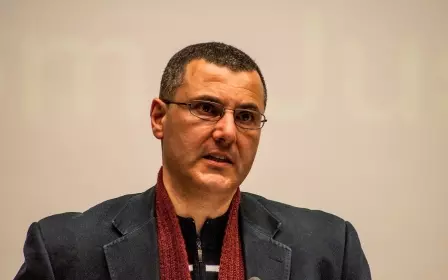Blacklisted: Why I will not allow Israel to defeat me

I do not have to imagine the anguish - yet determination - felt by the activists who are likely to be denied entry by Israel following the publication of its blacklist of organisations to be targeted for supporting the Palestinian people. I was denied entry at Tel Aviv airport in April 2017 shortly after the Israeli parliament, the Knesset, voted to ban supporters of boycotts against Israel.
Being denied entry to my homeland by a representative of a state that was built on the dispossession of my people was very difficult to grasp.
Denied entry
I had travelled with my wife and five-year-old son to spend the Easter vacation with family in Jerusalem. They were allowed in but I had to endure a 12-hour wait in a holding room for a flight back to Birmingham.
The British embassy told me they could not help as Israel was a "sovereign country", but Israel is not sovereign over the Occupied Palestinian Territory (OPT) including East Jerusalem where I was too be based.
We are on the right side of history, while the Israeli regime, which continues to delegitimise itself through its actions, will be consigned to the dustbin of history
Those wishing to visit the OPT can only do so via Israeli-controlled entry points either along the River Jordan or Tel Aviv airport.
I had mixed feelings about my experience - a combination of anger, helplessness and humiliation. But at no point did I regret anything that I had done that may have led to my being denied entry. I did, however, quickly understand more clearly than ever what it feels like to be a Palestinian refugee, to be so close to my homeland and not to be able to step out of the airport to see it, to smell it and to feel it. I always have this incredible feeling of belonging to the place as soon as I see the majestic Al-Aqsa mosque as I drive to the Mount of Olives where my wife's family have lived for centuries.
On the blacklist
The two weeks I spent back in Birmingham separated from my wife and son could have been extremely difficult under the circumstances. However, I was damned if I was going to sulk or allow Israel to defeat me. Rather than curtail my activism I wrote my story up, was interviewed by the media, wrote more op-eds about Israeli violations and tweeted just as much, if not more.
One of the reasons I was denied entry was I had a high profile in one of the organisations that appear on Israel's blacklist, the Palestine Solidarity Campaign (PSC), which has been campaigning for justice for Palestinians for nearly 40 years.
I had spent eight years as vice chair of the organisation but had stepped down from this position at the time of my being denied entry for personal reasons. However, I had done enough to appear on Israel's radar as a "problem".
The PSC is non-partisan, working for the right of the Palestinians to self-determination. It responded to the call from Palestinian civil society organisations in 2005 to support a campaign organised by the Boycotts, Divestment and Sanctions (BDS) movement against Israel until it ended the occupation, treated all its citizens equally and implemented the right of return for Palestinian refugees. All three demands are legal and moral.
Israel has attempted to present the BDS movement as anti-Semitic but this smear has no basis in reality.
The PSC worked closely with the BDS campaign and other organisations to pressure companies complicit in the occupation to reconsider their involvement, which led to some key successes including changes made by Veolia and G4S.
BDS success
In response to the BDS movement's growing successes, Israel has dedicated a minister, Gilad Erdan, and a ministry funded to the tune of millions to combat BDS activities but has failed to counter it through argument. It has resorted to legal means to bully those who may be tempted into supporting BDS, especially in the US and in Europe.
In the US, where Israel enjoys blind support, individual states have passed legislation that would punish those companies that may be suspected of refraining from doing business with Israel and to exact a price from individuals who support boycotts.
France has already effectively outlawed boycotts of Israel, using strict laws against "inciting discrimination", while the UK has attempted to stop local authorities boycotting Israeli companies through their specific ethical procurement guidance.
When the UK tried to apply similar pressure to local authority pension funds they were challenged by the PSC, which defeated the government in this matter. Yousef Munayyer, the director of the Campaign for Palestinian Rights, called the group’s inclusion a "badge of honour".
In a show of defiance, a number of the organisations on Israel's blacklist have come out to call their inclusion a badge of honour. They are in agreement that they will not be dissuaded from continuing to fight for justice for the Palestinian people and will even redouble their efforts.
Some have reported new members joining following the publication of the list. My guess is some organisations not included are feeling left out and will do even more in the coming years in support of the Palestinians.
It is personal
However, I, like Rebecca Vilkomerson, executive director of Jewish Voice for Peace, am hit doubly hard by the ban. First, I for now and Rebecca potentially are unable to visit Israel and the OPT to show our solidarity with Palestinians and Israelis striving for peace.
However, for her as an American Jew married to an Israeli with relatives there and myself as a Palestinian with relatives there, the impact on us is severe. It is personal.
The ban stops us ever seeing elderly members of our families. Certainly in my case my two remaining uncles are likely to die before I am next able to visit my homeland.
Following US President Donald Trump's decision to recognise Jerusalem as its capital, Israel has embarked on a set of measures to entrench its occupation, to complete the Judaisation of Jerusalem and to shut down criticism of its criminal policies.
It is even working to introduce the death sentence for Palestinians accused of carrying out operations against it. Those measures hardly indicate a desire by Israel for peace or that the conflict is about to end.
Against this background, Israel can be assured of one thing: individuals such as myself and organisations like the PSC will not be bullied. The peaceful but oppressed Palestinian people need us now more than ever.
We will continue to work using all peaceful means to support them until they have attained their rights whatever price Israel attempts to extract from us.
We are on the right side of history, while the Israeli regime, which continues to delegitimise itself through its actions, will be consigned to the dustbin of history. This is not a threat, but remember apartheid South Africa?
- Kamel Hawwash is a British-Palestinian engineering professor based at the University of Birmingham and a long-standing campaigner for justice, especially for the Palestinian people. He is vice chair of the British Palestinian Policy Council (BPPC) and a member of the executive committee of the Palestine Solidarity Campaign (PSC). He appears regularly in the media as commentator on Middle East issues. He runs a blog at www.kamelhawwash.com and tw
The views expressed in this article belong to the author and do not necessarily reflect the editorial policy of Middle East Eye.
Photo: A Palestinian boy walks past a mural calling on people to boycott Israeli goods in the al-Azzeh refugee camp near the occupied West Bank city of Bethlehem (AFP)
Middle East Eye propose une couverture et une analyse indépendantes et incomparables du Moyen-Orient, de l’Afrique du Nord et d’autres régions du monde. Pour en savoir plus sur la reprise de ce contenu et les frais qui s’appliquent, veuillez remplir ce formulaire [en anglais]. Pour en savoir plus sur MEE, cliquez ici [en anglais].






